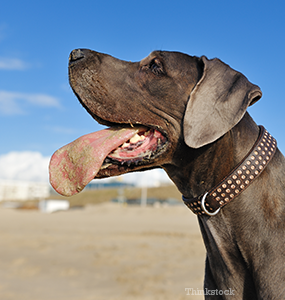
Dr. Phil Zeltzman is a traveling, board-certified surgeon in Allentown, PA. His website is www.DrPhilZeltzman.com. He is the co-author of “Walk a Hound, Lose a Pound” (www.WalkaHound.com).
Chris Longenecker, a Certified Veterinary Technician in Reading, PA, contributed to this article.
Some dog breeds are cute. Some dog breeds are elegant. Giant dogs are downright impressive.
Giant breeds include Mastiffs, Newfies, Great Danes, Saint Bernards, Great Pyrenees, Borzois, Irish Wolfhounds and a few others.
Before you fall in love with a cute, giant puppy (or even if you have one already) there are a few things you need to know about.
Bloat
Bloat is the ultimate killer. This complicated condition leads to extreme bloating of the stomach, which can sometimes twist around itself. As the stomach gets bigger, it pushes on every organ in the belly. The end result is pain, shock and retching, which means the dog tries to vomit but cannot.
This condition is only fixable with surgery. It is a true veterinary emergency as death of the organs (and the dog) can occur quickly. This condition occurs mostly in large breed and deep chested dogs.
To stop it from twisting, the stomach can be “tacked,” ideally, when a puppy is already under anesthesia to be spayed or neutered. Of course it can be done at any other time for at risk breeds. The stomach is sutured to the inside of the belly. It is important to understand that the stomach can still get distended with air, but it should not twist. Learn more about bloat here.
Orthopedic conditions
Giant breed dogs are prone to certain joint diseases: hip dysplasia, elbow dysplasia and ACL tears.
Hip and elbow dysplasia often occur in these giants because of their rapid growth from puppies to adults and poor breeding. A tear of the ACL (Anterior Cruciate Ligament) is one of the most common problems we see.
Bone cancer
Another condition that is mostly seen in large and giant dogs is bone cancer. It mostly affects older dogs and occasionally very young dogs. This aggressive disease requires aggressive treatment, which usually involves amputation and chemotherapy.
 Lifespan
Lifespan
It is a sad fact that giant breeds tend to have a shorter lifespan than small breeds. The exact reasons are controversial but this is something to be aware of. Then again, with better preventive medicine, better surgery and safer medications, we see giant dogs live longer than they used to.
Cost
The cost of food and medications for dogs who weigh 100, 150 or 200 pounds is important to keep in mind. The expense of a gentle giant is clearly going to be much higher than that of a Yorkie! For example, the cost of medications is proportional to the weight of the patient. So while a toy poodle may need 10 mg of a given medication, a Mastiff may need 200 mg.
Don't expect to buy a bag of dog food once a month. Giant breeds need a giant volume of food to keep up with their giant metabolism. You could easily feed 20 pounds of food a week and you should budget accordingly.
Some brands make dog food specifically for growing puppies. Be sure to ask your veterinarian about a quality, reputable brand that creates diets based on research—not just chemical recipes. Some poorly-balanced diets stimulate growth too quickly and cause all kinds of orthopedic problems.
Pet insurance
I firmly believe in the benefits of pet insurance. It is especially critical if you own a giant dog to help pay for possible giant bills. The best companies now accept genetic conditions.
Despite these potential conditions and the extra cost of food and medical care, giant dogs tend to give a giant amount of love and giant kisses!
If you have any questions or concerns, you should always visit or call your veterinarian -- they are your best resource to ensure the health and well-being of your pets.
![]()
